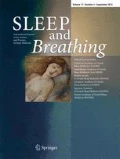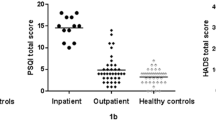Abstract
Background
Sleep disturbance is a common problem for caregivers. In general, patients with Duchenne muscular dystrophy (DMD) use noninvasive ventilation to maintain quality of life and improve survival.
Objective
The aim of this study was to evaluate the sleep quality of caregiver-mothers of sons with DMD and factors that are associated with their sleep quality.
Methods
We evaluated 32 caregiver-mothers of sons with DMD and 32 mothers of sons without any neuromuscular or chronic disease (control—CTRL group). The evaluation of quality of sleep was made using the Pittsburgh Sleep Quality Index (PSQI).
Results
Caregiver-mothers had poor sleep quality, specifically longer sleep latency and reduced sleep efficiency. The impaired sleep quality of the caregiver-mothers was associated with the length of time of noninvasive ventilation used by their sons.
Conclusions
Our results suggest that caregiver-mothers of sons with DMD have poor quality of sleep, and the length of use of noninvasive ventilation of their sons is associated with better sleep of caregiver-mothers.

Similar content being viewed by others
References
Peña-Longobardo LM, Oliva-Moreno J (2015) Caregiver burden in Alzheimer’s disease patients in Spain. J Alzheimers Dis 43:1293–302
Sautter JM, Tulsky JA, Johnson KS, Olsen MK, Burton-Chase AM, Lindquist JH et al (2014) Caregiver experience during advanced chronic illness and last year of life. J Am Geriatr Soc 62:1082–90
Kim Y, Schulz R, Carver CS (2007) Benefit-finding in the cancer caregiving experience. Psychosom Med 69:283–91
Connell T, Griffiths R, Fernandez RS, Tran D, Agar M, Harlum J (2011) Quality-of-life trajectory of clients and carers referred to a community palliative care service. Int J Palliat Nurs 17:80–5
Bevans M, Sternberg EM (2012) Caregiving burden, stress, and health effects among family caregivers of adult cancer patients. JAMA 307:398–403
Kim H, Rose K (2011) Sleep disturbances in family caregivers: an overview of the state of the science. Arch Psychiatr Nurs 25:456–68
Pawl JD, Lee SY, Clark PC, Sherwood PR (2013) Sleep loss and its effects on health of family caregivers of individuals with primary malignant brain tumors. Res Nurs Health 36:386–99
Meltzer LJ, Mindell JA (2006) Impact of a child's chronic illness on maternal sleep and daytime functioning. Arch Intern Med 166:1749–55
Boman K, Lindahl A, Björk O (2003) Disease-related distress in parents of children with cancer at various stages after the time of diagnosis. Acta Oncol 42:137–46
Wehrens SM, Hampton SM, Kerkhofs M, Skene DJ (2012) Mood, alertness, and performance in response to sleep deprivation and recovery sleep in experienced shiftworkers versus non-shiftworkers. Chronobiol Int 29:537–48
Pandi-Perumal SR, Verster JC, Kayumov L, Lowe AD, Santana MG, Pires ML et al (2006) Sleep disorders, sleepiness and traffic safety: a public health menace. Braz J Med Biol Res 39:863–71
Sarnat HB (2000) Neuromuscular disorders. Nelson textbook of pediatrics. WB Saunders, Philadelphia, pp 1881–2
Barbé F, Quera-Salva MA, McCann C, Gajdos P, Raphael JC, de Lattre J et al (1994) Sleep-related respiratory disturbances in patients with Duchenne muscular dystrophy. Eur Respir J 7:1403–8
Hachul H, Andersen ML, Bittencourt L, Santos-Silva R, Tufik S (2013) A population-based survey on the influence of the menstrual cycle and the use of hormonal contraceptives on sleep patterns in São Paulo, Brazil. Int J Gynaecol Obstet 120:137–40
Nozoe KT, Hachul H, Hirotsu C, Polesel DN, Moreira GA, Tufik S et al (2014) The relationship between sexual function and quality of sleep in caregiving mothers of sons with Duchenne muscular dystrophy. Sex Med 2:133–40
Buysse DJ, Reynolds CF, Monk TH, Berman SR, Kupfer DJ (1989) The Pittsburgh Sleep Quality Index: a new instrument for psychiatric practice and research. Psychiatry Res 28:193–213
Bertolazi AN, Fagondes SC, Hoff LS, Dartora EG, Miozzo IC, de Barba ME et al (2011) Validation of the Brazilian Portuguese version of the Pittsburgh sleep quality index. Sleep Med 12:70–5
Brummett BH, Babyak MA, Siegler IC, Vitaliano PP, Ballard EL, Gwyther LP et al (2006) Associations among perceptions of social support, negative affect, and quality of sleep in caregivers and noncaregivers. Health Psychol 25:220–5
McCurry SM, Logsdon RG, Teri L, Vitiello MV (2007) Sleep disturbances in caregivers of persons with dementia: contributing factors and treatment implications. Sleep Med Rev 11:143–53
Andrews MM, Nielson DW (1988) Technology dependent children in the home. Pediatr Nurs 14(111-4):51
Wang KW, Barnard A (2004) Technology-dependent children and their families: a review. J Adv Nurs 45:36–46
Nozoe KT, Moreira GA, Tolino JR, Pradella-Hallinan M, Tufik S, Andersen ML (2015) The sleep characteristics in symptomatic patients with Duchenne muscular dystrophy. Sleep Breath. doi:10.1007/s11325-014-1103-9
Suresh S, Wales P, Dakin C, Harris MA, Cooper DG (2005) Sleep-related breathing disorder in Duchenne muscular dystrophy: disease spectrum in the paediatric population. J Paediatr Child Health 41:500–3
Bloetzer C, Jeannet PY, Lynch B, Newman CJ (2012) Sleep disorders in boys with Duchenne muscular dystrophy. Acta Paediatr 101:1265–9
Petrone A, Pavone M, Testa MB, Petreschi F, Bertini E, Cutrera R (2007) Noninvasive ventilation in children with spinal muscular atrophy types 1 and 2. Am J Phys Med Rehabil 86:216–21
Lisboa C, Díaz O, Fadic R (2003) Noninvasive mechanical ventilation in patients with neuromuscular diseases and in patients with chest restriction. Arch Bronconeumol 39:314–20
Vianello A, Bevilacqua M, Salvador V, Cardaioli C, Vincenti E (1994) Long-term nasal intermittent positive pressure ventilation in advanced Duchenne’s muscular dystrophy. Chest 105:445–8
Nelson VS, Carroll JC, Hurvitz EA, Dean JM (1996) Home mechanical ventilation of children. Dev Med Child Neurol 38:704–15
Chestnut MA (1998) Pediatric home care manual: Lippincott-Raven
Folkman S, Lazarus RS, Gruen RJ, DeLongis A (1986) Appraisal, coping, health status, and psychological symptoms. J Pers Soc Psychol 50:571–9
Sheeran T, Marvin RS, Pianta RC (1997) Mothers’ resolution of their child’s diagnosis and self-reported measures of parenting stress, marital relations, and social support. J Pediatr Psychol 22:197–212
Nereo NE, Fee RJ, Hinton VJ (2003) Parental stress in mothers of boys with Duchenne muscular dystrophy. J Pediatr Psychol 28:473–84
Alhola P, Polo-Kantola P (2007) Sleep deprivation: impact on cognitive performance. Neuropsychiatr Dis Treat 3:553–67
Durmer JS, Dinges DF (2005) Neurocognitive consequences of sleep deprivation. Semin Neurol 25:117–29
Schulz R, Martire LM (2004) Family caregiving of persons with dementia: prevalence, health effects, and support strategies. Am J Geriatr Psychiatry 12:240–9
Acknowledgments
This work was supported by grants from Associação Fundo de Incentivo a Pesquisa (AFIP), CAPES, CNPq (M.L.A. and S.T. are recipients of the CNPq fellowship), and São Paulo Research Foundation (FAPESP) (#2014/08067-0 to KTN).
Conflict of interest
None of the authors have any conflict of interest to disclose. We confirm that we have read the journal’s position on issues involved in ethical publication and affirm that this report is consistent with those guidelines.
Author information
Authors and Affiliations
Corresponding author
Rights and permissions
About this article
Cite this article
Nozoe, K.T., Polesel, D.N., Moreira, G.A. et al. Sleep quality of mother-caregivers of Duchenne muscular dystrophy patients. Sleep Breath 20, 129–134 (2016). https://doi.org/10.1007/s11325-015-1196-9
Received:
Revised:
Accepted:
Published:
Issue Date:
DOI: https://doi.org/10.1007/s11325-015-1196-9



